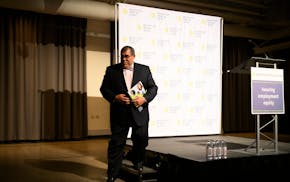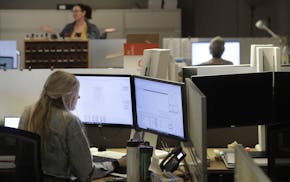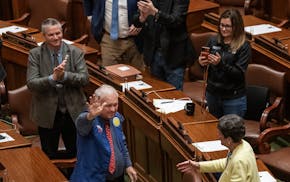A $24 million plastic recycling plant that will be the first of its kind in Minnesota promises to create a "circular economy" for flexible films and other plastics that typically end up in landfills.
South Africa-based Myplas intends to open its first American facility in Rogers early next year and will put 90 million pounds of recycled plastic back into the supply chain annually when at full capacity.
"This expansion was born out of two things: necessity and opportunity," said Myplas USA Chief Executive Andrew Pieterse. "Only 5% of films and flexible plastics get recycled in the U.S. This problem is huge."
The initiative, unveiled Wednesday, has the backing of several major Minnesota companies, which are investing a combined $9.2 million in the Myplas plant and will incorporate the recycled plastic in their products and supply chains.
"This plant alone will not solve the challenge we have with recycling, but the journey of a thousand miles begins with a single step," Jeff Harmening, chief executive of General Mills, said in an interview. "And we have a thousand-mile journey ahead to save the planet."
The state is also contributing $1.4 million in loans and grants for the facility, which will employ up to 300 people.
Members of MBOLD — a coalition of Minnesota businesses and the University of Minnesota — have made a variety of commitments that helped land Myplas in the state.
This effort will focus on plastics used by businesses, like shrink wrap on pallets, with the hope the initiative eventually boosts opportunities for consumers to recycle plastic films and bags, which will continue to be limited to drop-off sites around Minnesota.
"As a coalition of business leaders, one thing we can control is our own stream of flexible films," said JoAnne Berkenkamp, managing director of MBOLD. "We also see significant opportunities in agricultural plastics such as haybale wrap, grain bags and other uses."
More than 12 billion pounds of flexible packaging and plastic films are used in the U.S. annually, and nearly all of it ends up in landfills. Even at full capacity, Pieterse acknowledged Myplas' first U.S. facility will only make a small dent in diverting that waste. His goal is to add more capacity as demand for recycled plastic increases.
"That's the ultimate vision," he said. "But it does take a collaboration across the supply chain to make it work."
One of the reasons it is difficult to recycle flexible films — which include plastic shopping bags, freezer and trash bags, shrink wrap and a wide variety of packaging materials — is the lack of demand for the recycled plastic.
Charter Next Generation, which manufactures food- and medical-grade plastics, has committed to buying the recycled plastic resin Myplas will produce and is one of the lead investors in the Rogers facility.
"We've got to start somewhere, and demand is the right place to start," said Kathy Bolhous, chief executive of the Wisconsin-based company. "I would love to see this model be a tremendous success, which would enable us to do this in other parts of the country and expand more broadly in Minnesota."
Charter Next Generation produces nearly a billion pounds of plastic per year. And while it is difficult to make film from 100% recycled plastic, increasing the percentage can have compound effects.
"Every time you use recycled resin you reduce the need for virgin plastic and prevent it from going into a landfill," Bolhous said.
Along with General Mills, MyPlas investors include Schwan's Co., Target and Ecolab. Cargill, Land O'Lakes and the U will also join efforts to direct plastic waste to Myplas and discover new product applications.
Schwan's CEO Dimitrios Smyrnios said the project "fits perfectly into our goals around environment and sustainability."
"This is a tangible initiative we are working on," he said. "And there is a certain Minnesota pride that comes with this happening here — this is a really good story for Minnesota."
The Alliance to End Plastic Waste and Closed Loop Partners are also helping to finance Myplas as part of efforts to reduce landfill waste and fossil fuel use.
As plastic recycling increases — in Minnesota and elsewhere — Berkenkamp says companies and consumers can break out of the "linear system" where products are made, used once and thrown out.
"What we're trying to create here is a circular economy where things are made with recycled content. They're used, collected, recycled and remade," she said. "It has the potential to keep plastic waste out of the environment, to cut emissions, to increase recycling and to make it possible for more products to contain recycled resin and therefore reduce reliance on virgin plastics."
Party City to shutter hundreds of stores across the U.S., including 10 in Minnesota

Ramstad: Let's create more modest expectations about reining in federal spending

St. Paul civic booster Paul Williams looks back, and forward, as he retires from Project for Pride in Living

Yuen: What do women want from the workplace in 2025?

